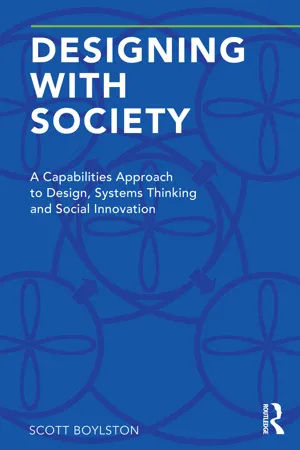
Designing with Society
A Capabilities Approach to Design, Systems Thinking and Social Innovation
Scott Boylston
- 240 pagine
- English
- ePUB (disponibile sull'app)
- Disponibile su iOS e Android
Designing with Society
A Capabilities Approach to Design, Systems Thinking and Social Innovation
Scott Boylston
Informazioni sul libro
This book explores an emerging design culture that rigorously applies systems thinking to the practice of design as a form of facilitating change on an increasingly crowded planet. Designers conversant in topics such as living systems, cultural competence, social justice, and power asymmetries can contribute their creative skills to the world of social innovation to help address the complex social challenges of the 21st century.
By establishing a foundation built on the capabilities approach to human development, designers have an opportunity to transcend previous disciplinary constraints, and redefine our understanding of design agency. With an emphasis on developing an adaptability to dynamic situations, the cultivation of diversity, and an insistence on human dignity, this book weaves together theories and practices from diverse fields of thought and action to provide designers with a concrete yet flexible set of actionable design principles. And, with the aim of equipping designers with the ability to drive long-term, sustainable change, it proposes a new set of design competences that emphasize a deeper mindfulness of our interdependence; with each other, and with our life-giving natural systems. It's a call to action to use design and design thinking as a tool to transform our collective worldviews toward an appreciation for what we all hold in common; a hope and a belief that our future is a place where all of humankind will flourish.